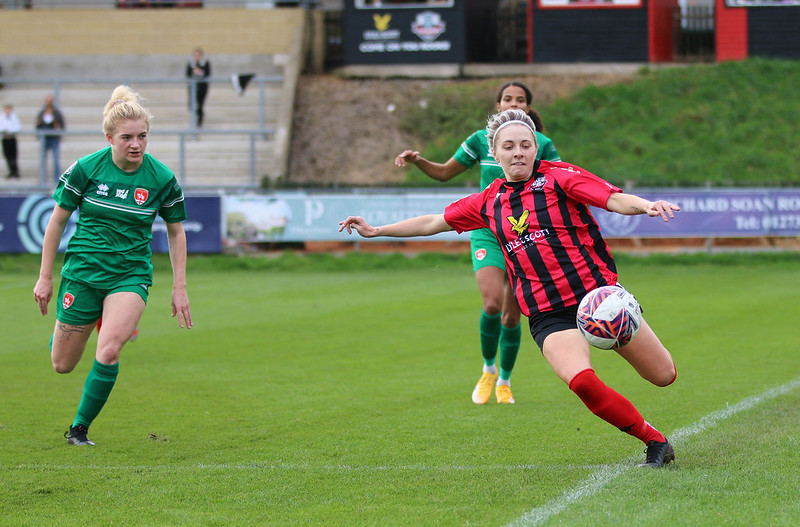Equality FC
“I don’t know what to say”, says Lewes FC’s Paula Howells. The midfielder is full of nerves in an upstairs room of The Grand Central pub in Brighton on a March evening this year:
“Just talk about any obstacles you’ve had to overcome as a female footballer,” I say, amazed that this young woman, capable of scoring the most incredible goals on the pitch, should ever feel she cannot absolutely own the room.
We’re waiting for the ‘Brighton Belles’ – Women’s Institute group for central Brighton – to arrive for their monthly meeting. We’re the star guests.
I regularly do talks for women’s groups on ‘Equality FC’ and why Lewes Football Club was the first to close the gender pay gap in football – splitting playing budgets equally. And I love having a female footballer with me because they always – always have stories to tell about sexist difficulties faced along the road to reaching elite-level championship with Lewes FC.
Usually, their experiences involve having to pay for their own kit and travel, the last choice of pitch-time at their clubs, struggling to find girl’s or women’s teams to play with, denied gifts from sponsors ‘as they’re only for the men’, sexist abuse from men’s fans – or getting little or no medical care for injuries.
But Paula – mad keen on football from an early age – recounts an incident in year 9 at school when the (men’s) World Cup was on. Her school had agreed to give all the boys the afternoon off to watch England, but the girls were told to stay at school all day.
Thirteen-year-old Paula Howells – already a better footballer than any boy in her school – campaigned against this, dead keen to watch her heroes in the World Cup. But to no avail. “The school said it wasn’t allowed and everyone was to go back to lessons, and I got into quite a bit of trouble for it!”, she told us.

Our Howells
Twelve years later and you’ll catch Howells at The Dripping Pan on a Sunday playing for Lewes, spurred on by fans gamely chanting “Our Howells, In the middle of our pitch”, to the tune of Madness’ ‘Our House’, every time she has the ball.
Here, she plays on the same pitch as Lewes FC Men, with the same training facilities and coaching supporting her development, with equal marketing resources behind her and her teammates, knowing fans pay the same ticket price to see her as they do her male counterparts. Why should it be any other way?
Unsuitable for females
Well, the male bastion of football is a special case of sexism. It’s the most popular sport in the world, closely followed by some 3.6 billion fans around the globe, mainly male, who have been known to say it is more important to them ‘than my girlfriend’.
It is played mainly by men (most major footballing countries having banned women from playing at some point in their history, making the game institutionally and culturally male). And when it is broadcast on TV or reported on in newspapers, it is almost universally men’s games that are covered. You would be forgiven for thinking women didn’t play.
They do of course. And England has just won their first major footballing trophy in 56 years, ending 101 years of hurt for female footballers who were banned from playing in England from 1921 until 1971 on the FA’s dubious grounds that football was a sport ‘highly unsuitable for females’.
Whilst many have been caught up in the party atmosphere of those joyous Euros matches here in England – some following for the first time – there has inevitably been sexism to navigate.
Women’s Euros 2022
Much like Paula’s school ten years ago, government officials very quickly ruled out the possibility of an extra bank holiday before the event and, of course, annual leave and sickness levels were far lower than the run-up to the men’s Euros last year.
Conversely, sexist comments online increased, as noted by Team Heroine and Areto Labs. Despite a whopping 17 million people tuning in to watch England triumph over Germany in the final at Wembley, we know that 31 million viewers watched the men’s final on TV and that there is still a big difference in attitudes towards men’s and women’s football.
Interest has gone up several notches, but the women’s game still has a way to go before it hits the fever pitch of men’s football. Whilst this can’t happen in one fell swoop, it’s encouraging to think that women’s football – with all its stereotype-busting potential and strong values of inclusivity, inspiration and the collective – may be only years away from achieving the kind of influence we see in the men’s game.
Make women’s football work for you
To help this happen and allow women’s football to develop along a trajectory that is true to its history and culture-changing mission, workplaces can use it as a vehicle to change sexist and misogynistic attitudes amongst employees:
- Arrange group bonding visits to support your local women’s team’s matches
- Host women’s football chanting workshops in lunchbreaks geared towards encouraging female employees to chant (hint: start by showing a quick clip of the New Zealand Rugby team’s Hakka)
- Consider hosting work Awaydays or meetings at your local women’s football club, welcoming female employees into the environment
- Invite a local women’s team player in to do an inspiring lunchtime talk about her journey (and pay her for it!)
- Include women colleagues in conversations about football, and make sure it’s about women’s games too

- Educate yourself on the history of the women’s game – here’s a good piece by Emily Bowe of ‘The Level Playing Field’
- Consider sponsoring a women’s match or team to show your employees your alignment with their values
- When you talk about the World Cup next year, make sure you refer to it as the “Men’s World Cup” – language is important
- Arrange opportunities to watch women’s football screenings together – you could even show this great documentary on gender-equal Lewes FC!
- On that last note consider buying shares in gender-equal football clubs. For us, it will help us in our ambition to get our women’s team into the Women’s Super League alongside the big Premier League clubs.
Football reflects and impacts the wider world, and as England Manager Sarina Wiegman said in her recent post-win interview: ‘We have changed society’. Help cement that change and build upon it, so that everyone can happily RSVP to the invites to the fantastic parties that are women’s football matches.
Interested in this topic? Read #CallHimOut: Lewes FC gender equality campaign evolves to male allyship
[cm_form form_id=’cm_65a14c3f5da64′]






